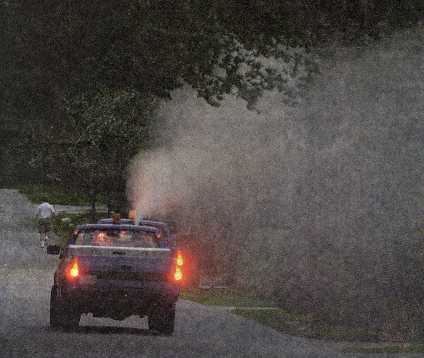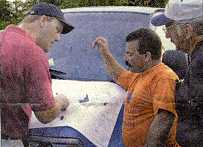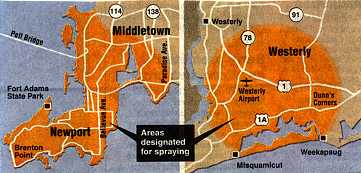
Journal photos/KRIS CRAIG
ON THE ATTACK:
A truck sprays pesticide on Webster Street, in Newport, yesterday. Below, Tree Warden Scott Wheeler, left, reviews the routes with employees John Medeiros and AI Truver.| Previous story | Next story | Spraying home |
Providence Journal 8/29/00 Back
At war with West Nile
|
|
|
Journal photos/KRIS CRAIG |
|
ON THE ATTACK: A truck sprays pesticide on Webster Street, in Newport, yesterday. Below, Tree Warden Scott Wheeler, left, reviews the routes with employees John Medeiros and AI Truver. |
Newport, Westerly unleash pesticide
By S.I. ROSENBAUM
Journal Staff Writer
NEWPORT - The police cruiser glided down Bellevue Avenue at a stately pace, lights flashing. Patrolman Robert Goldman announced through a loudspeaker from the car:
"Mosquito spraying will commence in approximately five minutes. Please take personal precautions."
Soon, a milky white haze of pesticide streamed from the back of a blue city truck traveling behind the cruiser, swirling 150 feet in all directions, among the trees and the mansions.

Last night, nearly all of Newport, as well as parts of Middletown and Westerly, were sprayed in response to the discovery on Saturday of the West
Nile virus in two crows one found dead on Sherwood Drive in Westerly, the other on Cliff Terrace in Newport.
The West Nile virus, which can lead to inflammation of the brain, is rarely fatal in humans, but can cause death in the elderly or those who are sick. It lives in birds, especially the American crow, and can be carried from birds to humans by the culex or common mosquito.
The virus, native to Asia, Africa and the Middle East, was first found on this continent last year in New York City. No one knows how the virus crossed the Atlantic - the carrier could have been a bird, human or mosquito. The city was unprepared and in the outbreak 69 were hospitalized and 7 - all elderly - died.
Most people who are infected experience flu-like symptoms; many never realize they have the virus, said Robert Marshall, assistant director of the state Department of Health. The virus is treated symptomatically, he said, and there is a vaccine. "Fortunately, most people get better on their own," Marshall said. "It's a very rare disease."
 |
This summer, only three human cases have been confirmed; all were in New York. The first discovery of the virus in Rhode Island was in Warwick earlier this month, though the virus has been found in dead birds in Massachusetts, Connecticut, New York, Maryland and New Jersey. Spraying in Warwick greatly reduced the mosquito population.
But pesticide is not a permanent solution.
"Mosquitoes are being horn all the Stephanie Powell, a time," said Department of Environmental Management spokeswoman. "[Spraying] is just a temporary thing. We're never going to get all the mosquitoes."
Only one generation of insects will be knocked out by the spray. The spraying range is based on the assumption that a dying crow does not have the strength to travel far, and has stayed in one area for days or weeks. .Accordingly, the towns sprayed in a two-mile radius of the spots where the crows were found.
|
digital |
Find out more about the West Nile virus , from recent local news to information about the disease to preventive measures, at |
At 6 p.m., at the Town Yard off Route 138 in Newport, the rig crews gathered. Scott Wheeler, Newport's tree warden and mosquito abatement coordinator, leaned over a map spread across the hood of a van, pointing out the different routes the rigs were to take.
Green pumps strapped to plywood bases were loaded into the back of pickup trucks, along with cardboard boxes of pesticide. Each box bore the logo of the chemical company that manufactured it: a dead mosquito in a circle. Live mosquitoes batted about the rigs.
At 7 p.m., the spray rigs, on loan from the state Department of Environmental Management, fanned out in all towns - two in Newport, two in Westerly, and one in Middletown.
Middletown planned to be finished with its single rig by about 10 p.m., at which time it would be turned over to Newport to help finish the job. Only parts of Middletown were sprayed: Easton Point, Continental Village, and the west side of town near the Newport border.
In all towns, the spray rigs stayed away from water, because the pesticide is harmful to fish. They also skirted the homes of beekeepers and people with allergies who had called in to the towns' public works departments during the day.
|
`Fortunately, most people get better on their own. It's a very rare disease.' Robert Marshall, Health Department |
In Newport, almost all the city was sprayed; not only residential areas but also commercial ones. Susan Cooper, director of parks, recreation and tourism, said that the Department of Public Works planned to spray near Thames Street and on parts of America's Cup Avenue only at the end of the run, near midnight, when streetside dining establishments would have closed.
But last night, the DPW decided not to spray on Thames Street because of the crowds. "There will be people everywhere," Cooper said. "They'd end up turning off the sprays more often than they were on."
If the rigs encountered many people on a street, the drivers had been instructed to turn off the sprayers, she said.
The streets near Thames Street were sprayed but officials did not expect it to affect Newport's night life.
"My outdoor service stops before midnight because the deck has to be cleared by midnight," said Richard Sardella, mayor of Newport and owner of Sardella's on Memorial
Boulevard. He said he didn't think he would have many outdoor diners
anyway: "It's really not that nice a night, and it is a Monday night, so it's one of the slower nights of the week."
Sardella said he doubted the spraying would dampen his business. "It may even be a little bit of a boom," he said. "If you can't go out for 15 minutes after the spray, you're more likely to stay where you are."
Residents were cautioned to stay indoors after the rigs passed, to let the pesticide settle. They were also advised to bring lawn chairs and children's toys indoors to avoid the spray. But both Cooper and Wheeler stressed that the pesticide - a substance called Sumithrin - is only slightly toxic to humans.
"There really is no need to panic if people found themselves in the street and felt they got hit by the mist," Wheeler said. "It's the same material you'd be exposed to if you gave your pet a flea bath."
Cooper said that the pesticide breaks down when exposed to sunlight. "Tomorrow is supposed to be a nice day, so as soon as the sun comes out, all trace of it will be gone," she said.
|
READY TO GO: Journal photo/KRIS CRAIG |
|
| Top | Previous story | Next story | Spraying home |